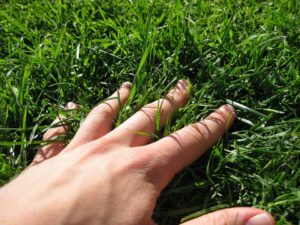For lawn owners, be they homeowners or businesses, winter is one of the most vital periods of the year when it comes to turf maintenance. With frosts, water-logging and lack of sun all doing their best to hinder your lawn’s progress, you need to be at the top of your maintenance game to get your lawn through this trying period.
If your area is prone to colder winters, such as those found in the more temperate, southern areas of Australia, your backyard will most likely be lined with a cool season grass such as Fescue, Ryegrass, or Kentucky Bluegrass. These grasses will generally experience their peak growth periods in spring, making your lead-up maintenance efforts over winter all the more important.
For some, there may be value in hiring a professional to see your lawn through the winter. Leaving your grass in expert hands can be the reliable way to ensure that it makes it through the cold. For others, however, the value simply won’t be there, and a DIY option may be more appropriate.
So which side of the winter maintenance fence do you fall on? In order to find out, we’ll first need to identify what’s involved in a solid winter lawn maintenance routine.
The Ins and Outs of Winter Lawn Maintenance
In terms of mowing, winter is the least demanding time of year. Many grasses go into a state of hibernation, using any available nutrients to simply survive rather than grow. As such, mowing takes a back seat. Even if your grass does grow, it’s recommended that you cut it higher than normal anyway, as the greater surface area of the blade allows for more photosynthesis to occur in the often sun-deficient winter months.
This need to access whatever sun is available, as well as the debris created by the falling leaves of autumn, will require a greater amount of raking. Ensuring that your lawn is free of debris will help to prevent the formation of any brown patches.
Broadleaf weeds love the damp conditions of winter, so weeding will take the place of mowing as a weekly or fortnightly job. Thankfully the moist ground should make removing any invaders fairly easy. Think twice before pulling clover out of your lawn, as if you can deal with the look, it will enrich your soil with nitrogen.
Those heavy winter rains won’t be able to penetrate the surface if your soil is heavily compacted. As such, winter is the ideal time to aerate your lawn. This will allow nutrients to flow through your soil, giving the lawn’s roots easy access to a meal. You can either hire an aerator or use a garden fork to create aeration holes 15cm deep.
Speaking of nutrients, winter is the perfect time to impregnate your soil with the sort of three-course dinner that will have it growing big and strong in the spring. Fertilising with a winter-specific mix can also help strengthen and green up your lawn while the cold weather has it at its most vulnerable. These fertilisers tend to be higher in iron and lower in phosphates.
DIY or Professional?
In the end, your choice of DIY or professional winter lawn care will come down to whether you feel as though you’ll get reward for the amount of effort required. For businesses with larger areas of lawn, hiring a professional may be the obvious choice. For homeowners with just a small patch to take care of, it may make more sense to do it yourself.
It’s important to note that while regular mowing may not be as vital over winter, the other aspects of good lawn maintenance – raking, weeding, aerating and fertilising – may require more attention during the colder months than they do throughout the rest of the year. This being the case, the ease and expertise that comes with hiring a professional may be a terrific choice no matter your situation, and one that benefits your lawn for the rest of the year.
For any other winter lawn maintenance queries, contact the friendly team at McKays.



